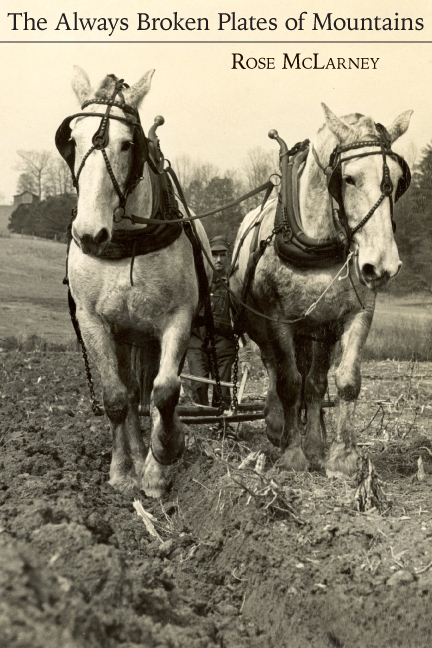
paper • 80 pages • 15.95
ISBN-13: 978-1-935536-19-2
Set in the Appalachian landscape, Rose McLarney’s debut collection, The Always Broken Plates of Mountains, gives voice to a chorus of speakers, who are at once plainspoken, reverent, and musical. “There is a tenderness that persists” as McLarney explores what it means to be faithful—to the land, to one’s heritage, to one another. “I’ll choose a love, as I choose my home,/ an old white farmhouse, not far from where I grew up,” one speaker declares. And while the poems often feel as if they exist outside of time, they possess a quiet immediacy, “Love always shot/ with the feeling this is the last of it./ Always told to outgrow/ the mountains that would block your view.”
McLarney, a deft storyteller and graceful observer of the lyric moment, leads us into this “country for the ones who have stayed/ true to self sufficiency and silence,” and guides us through what is so lovingly built and what is left behind, what we hold onto and what we cannot keep from changing. “We are so harmed we are beautiful,” she writes, “the buildings abandoned by paint, the now unfarmed fields,”—but even through divorce and drought, even as the cattle market is turned into condos and the family land is clear-cut for the interstate, poem after poem reminds us “it’s only after the freeze/ that the trees can keep their needles, / no matter how you shake them.” The Always Broken Plates of Mountains honors the people who live and love and lose on the land, trying to preserve it by telling their stories while “leaving no/ fingerprints, making no mark.”
“Domestic,” from The Always Broken Plates of Mountains:
The sows are in heat, squealing and pink.
The wild boar comes from the forest
to batter at their pen.
I go out and smash the ice
on the trough. The water
breaks free. This takes
a pick ax. Wielding it, I feel wild.
But the only strength in this story
is the fences’. Not even boars are wild –
imported for hunting a hundred years ago,
crossing the sea in a rich man’s crate.
When I hang up the pick ax
it freezes to the nail, clinging as I do,
making my living elsewhere and
returning to farms after sunset,
the barns symbols
just discernable in the dark.
“Though thick with fences, barns, and livestock, The Always Broken Plates of Mountains is not a book about a way of life; it’s a book about life beyond a single lifetime, the whole, continuous life of one place and the generations of human fidelity to it. Pinched with grief, then soothed with beauty […] McLarney observes a world charged with the ‘magic of slowness,’ a phrase that pulses with the truth.” —Maurice Manning
“Rose McLarney’s poems are work of the first order. Unsentimental, empathic, informed by her unerring eye and ear, they are rooted in a specific quarter of the earth and speak to the complexities of fidelity, devotion, desire, and the force of time.” —Jane Brox